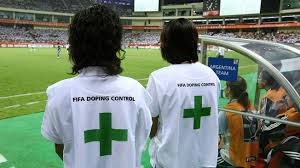By David Owen
April 29 – FIFA will run up $250,000 in extra costs as a result of having to send samples from this summer’s World Cup across the Atlantic for analysis, the chairman of the body’s Medical Committee has acknowledged, as he set out plans for the most extensive anti-doping controls ever at international football’s flagship tournament.
Contacted by INSIDEworldfootball, Michel D’Hooghe explained that almost 1,000 anti-doping controls in all would be effected, with all 736 selected players undergoing out-of-competition blood and urine tests.
Two players per team would then be selected for in-competition tests at each World Cup match.
D’Hooghe confirmed that testing would be conducted for the blood-boosting drug erythropoietin (EPO) and human growth hormone (hGH), as well as for anabolic steroids.
For the first time, information collected at a World Cup will be used to help to construct footballers’ biological profiles, in an attempt to pinpoint suspicious patterns that might be indicative of doping.
D’Hooghe said that data derived from three Club World Cups and last year’s Confederations Cup test event was already being used for this purpose.
He also said that FIFA has decided to keep Brazil 2014 samples for eight years, to permit retrospective testing where this is judged necessary.
Samples collected from World Cup players are to be analysed at a laboratory in the Olympic capital of Lausanne because of last year’s revocation by the World Anti-Doping Agency (WADA) of the accreditation of the so-called Ladetec laboratory in Rio de Janeiro.
D’Hooghe said that samples would be sent immediately after matches by DHL to Switzerland.
Even so, he could not be sure in every case that the results of the tests would be available before the next matches of the teams in question.
Relatively remote venues – such as Manaus, where England are due to play Italy on June 14, and Cuiabá, where Nigeria take on World Cup debutants Bosnia and Herzegovina a week later – are likely to pose a particularly tough logistical challenge.
Commenting on the extra cost, D’Hooghe said he would “prefer to have [the money] for youth formation”.
He said, however, that his Brazilian colleagues were both competent and very motivated.
The inability to test World Cup samples locally is just one of the ways in which the Brazilian authorities’ efforts to use the biggest global sports events to build the country’s brand image as a sophisticated modern society have been undermined by pre-tournament setbacks.
Contact the writer of this story at moc.l1745207473labto1745207473ofdlr1745207473owedi1745207473sni@n1745207473ewo.d1745207473ivad1745207473

